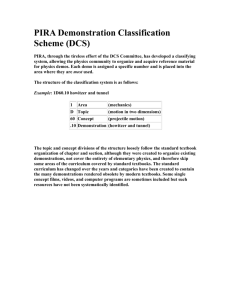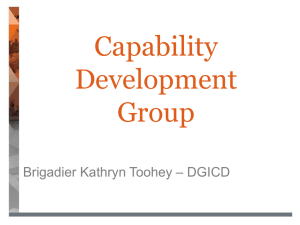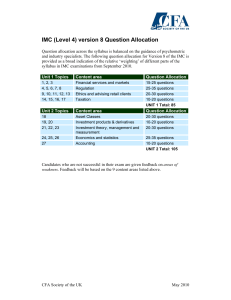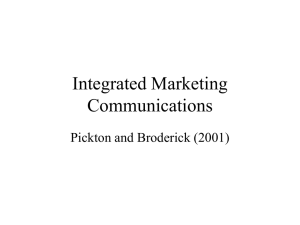the Independent Monitoring Commission
advertisement
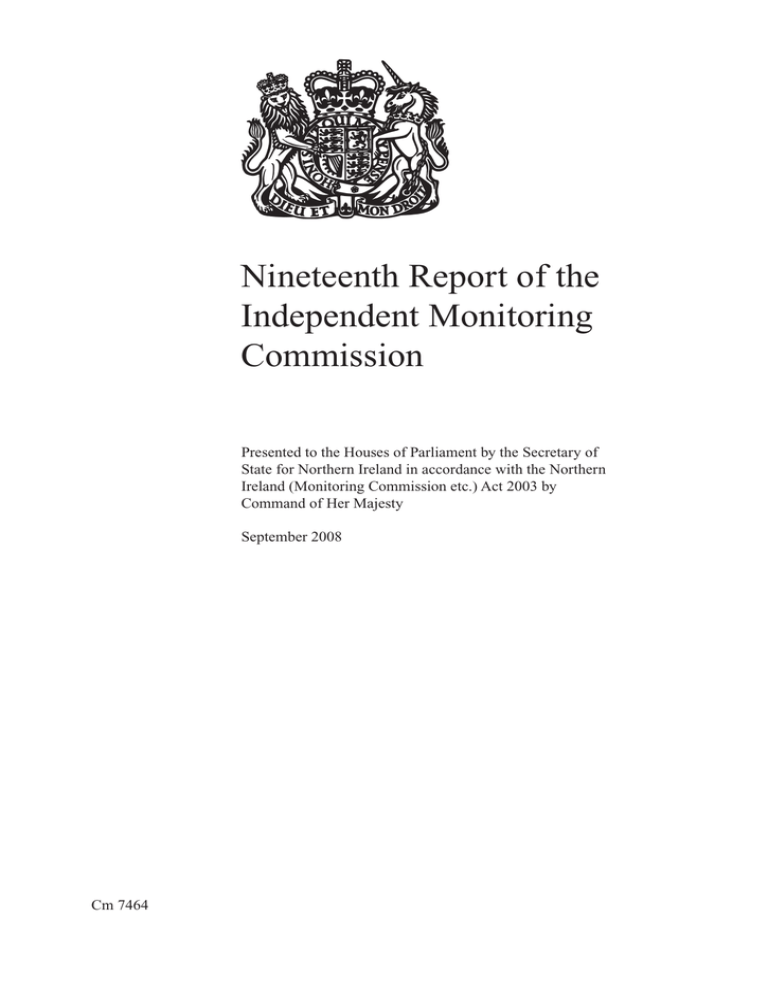
Nineteenth Report of the Independent Monitoring Commission Presented to the Houses of Parliament by the Secretary of State for Northern Ireland in accordance with the Northern Ireland (Monitoring Commission etc.) Act 2003 by Command of Her Majesty September 2008 © Crown Copyright 2006 The text in this document (excluding the Royal Arms and departmental logos) may be reproduced free of charge in any format or medium providing that it is reproduced accurately and not used in a misleading context. The material must be acknowledged as Crown copyright and the title of the document specified. Any enquiries relating to the copyright in this document should be addressed to The Licensing Division, HMSO, St Clements House, 2-16 Colegate, Norwich, NR3 1BQ. Fax: 01603 723000 or e-mail: licensing@cabinet-office.x.gsi.gov.uk Cm 7464 Nineteenth Report of the Independent Monitoring Commission Presented to the Houses of Parliament by the Secretary of State for Northern Ireland in accordance with the Northern Ireland (Monitoring Commission etc.) Act 2003 by Command of Her Majesty September 2008 © Crown Copyright 2006 The text in this document (excluding the Royal Arms and departmental logos) may be reproduced free of charge in any format or medium providing that it is reproduced accurately and not used in a misleading context. The material must be acknowledged as Crown copyright and the title of the document specified. Any enquiries relating to the copyright in this document should be addressed to The Licensing Division, HMSO, St Clements House, 2-16 Colegate, Norwich, NR3 1BQ. Fax: 01603 723000 or e-mail: licensing@cabinet-office.x.gsi.gov.uk Cm 7464 £5.15 © Crown Copyright 2008 The text in this document (excluding the Royal Arms and other departmental or agency logos) may be reproduced free of charge in any format or medium providing it is reproduced accurately and not used in a misleading context.The material must be acknowledged as Crown copyright and the title of the document specified. Where we have identified any third party copyright material you will need to obtain permission from the copyright holders concerned. For any other use of this material please write to Office of Public Sector Information, Information Policy Team, Kew, Richmond, Surrey TW9 4DU or e-mail: licensing@opsi.gov.uk ISBN: 9780101746427 CONTENTS 1. Introduction 2. The Leadership and Transformation of PIRA ANNEXES I Articles 4 and 7 of the International Agreement II The full text of the two Governments’ letter III The IMC’s Guiding Principles 1 1. INTRODUCTION 1.1 We present this report under Articles 4 and 7 of the International Agreement establishing the Independent Monitoring Commission1. 1.2 On 8 July 2008 the British and Irish Governments exercised their powers under Article 4(c) and asked us to produce an ad hoc report. They referred to what we had said on the leadership of PIRA in our previous report in May 2008, asked for our further views on this issue, and sought a fuller assessment of the completion of the transformation of PIRA2. This report is in response to that request3. 1.3 This is the first occasion on which the two Governments have asked us to present an ad hoc report although we have presented two on our own initiative4. The report is confined to responding to the request and therefore differs from our usual ones under Articles 4 and 7 which deal with continuing paramilitary activity on the part of all paramilitary groups. We expect to deliver our next full report in October 2008. 1.4 Although this report is therefore different in purpose and form, the factors which have guided us throughout our work remain just as important to us. They are: - The objective of the Commission, set out in Article 3 of the International Agreement: The objective of the Commission is to carry out [its functions] with a view to promoting the transition to a peaceful society and stable and inclusive devolved Government in Northern Ireland. 1 The text of Articles 4 and 7 is in Annex I. IMC Eighteenth Report, May 2008, paragraph 6.5. 3 We expand on the request from the two Governments in paragraph 2.1 below and give the full text of the Governments’ letter in Annex II. 4 The two Governments did however ask us to advance the date of presentation of our First Report, which we did, presenting it in April 2004. The two ad hoc reports presented on our own initiative were: IMC Fourth Report, February 2005, which dealt with the robbery at the Northern Bank, Belfast in December 2004, and IMC Sixth Report, September 2005, which dealt with the feud between the UVF and LVF. 2 2 - The principles about the rule of law and democratic government which we published in March 2004 and which we set out in Annex III. 1.5 We wish to reiterate two points about the nature of our work, which also apply as much to this report as to our fuller ones: - We believe that we are fair and thorough in the methods we employ; we take a great deal of care in all our assessments; and we always seek to learn from those who have comments on what we have said. We continue to welcome candid comment; - The views we express here are ours alone. We are an independent Commission and expect to be judged by what we say. We do not make statements of official policy. It is up to the two Governments and, as appropriate, the Northern Ireland Executive and Assembly, to respond to what we say. 3 2. THE LEADERSHIP AND TRANSFORMATION OF PIRA 2.1 In making their request the British and Irish Governments referred to paragraph 6.5 of our Eighteenth Report which said: “So far as the paramilitary groups are concerned, they must obviously demonstrate that they have finally disposed of all their terrorist capabilities and weapons. We have previously recognised that to undertake and manage this change they must retain command and planning structures; no organisation can transform itself without personal and institutional leadership. But they do need to go further. Relinquishing the leadership structures appropriate to a time of armed conflict is the signal that they have emerged at the other end of the process. In so far as PIRA is concerned, we assess that in practice this transformation is all but complete.” The two Governments said they had noted the significance of these remarks and that they would welcome our “further views on this issue and a fuller assessment of the completion of the transformation of PIRA.” They sought an ad hoc report no later than 1 September 2008. The full text of the letter from the two Governments is in Annex II. General Issues 2.2 The remarks in our previous report were focused on leadership. We want to draw attention to the phrase we used, which in our view is key to understanding the transition of a paramilitary group to an entirely peaceful position: “relinquishing the leadership structures appropriate to a time of armed conflict”. By referring to the relinquishing of such structures we recognised that the process of change might not and need not necessarily involve their being formally or publicly abandoned. What matters is that the armed conflict is completely over and the leadership structures have definitely ceased to function in the way they did during the time of conflict, by whatever means that end might be attained. 4 Changes So Far 2.3 In July 2005 PIRA formally announced the end of its armed campaign and instructed its volunteers to cease all activities and to commit to exclusively peaceful means to pursue its objectives. In September 2005 it decommissioned its weapons. 2.4 In our Twelfth Report in October 2006 we compared the position of all the paramilitary groups then and three years before in late 20035. We referred to the leadership of PIRA as having changed profoundly and adopted a clear strategy to follow a political path6. We said that no other paramilitary organisation had undergone this transformation7. 2.5 In the almost two years since then we have noted further changes. Events which we considered significant included the decision of the Sinn Féin Ard Fheis on 28 January 2007 to support policing and the criminal justice system8; the commitment in PIRA’s 2007 Easter statement to following purely peaceful and democratic means9; Sinn Féin’s entry into the Northern Ireland Executive in May 200710; and the number of people making the transition from PIRA to Sinn Féin and thereby to engagement in democratic politics11. These are major elements in the much wider process of change which we described in our reports over this period and which led us to the judgement in the paragraph cited by the two Governments in their letter requesting this report. The Present Position 2.6 We think that we can most usefully respond to the request from the two Governments first by posing and answering a series of questions and then by drawing our conclusions. The comments in this report should be seen in the context of those in all our previous reports on paramilitary activity. 5 IMC Twelfth Report, October 2006, Section 5. IMC Twelfth Report, October 2006, paragraph 5.17. 7 IMC Twelfth Report, October 2006, paragraph 5.18. 8 IMC Thirteenth Report, January 2007, paragraphs 2.18 and 2.19. 9 IMC Fifteenth Report, April 2007, paragraph 2.17. 10 IMC Seventeenth Report, November 2007, paragraph 2.2. 11 IMC Eighteenth Report, May 2008, paragraph 2.19. 6 5 2.7 Is PIRA committed to following an exclusively political path? We are convinced that it is. The leadership has consistently taken a stand on this, not only through public statements but also with the members of the organisation, which is arguably more persuasive as evidence of real intent and delivery. The strategy is firm and clear. Consistent with this strategy, significant numbers of PIRA members, including senior ones, have, at the behest of the leadership, moved to political roles in Sinn Féin. Others have moved to community work or have dropped out of activism entirely. The membership has backed the strategy and we can see no grounds on which it would or could be reversed. 2.8 Has PIRA abandoned its terrorist structures, preparations and capability? We believe that it has. The so-called “military” departments have ceased to function and have been disbanded. It has been put to us that these structural changes have had a profound and debilitating effect on the organisational capacity of PIRA. We share that view and consider that the organisation’s former terrorist capability has been lost. PIRA is not recruiting or training members and the membership continues to decline, and there is some issue as to what membership means in the absence of activity. In so far as gathering information or intelligence may continue in any limited way – not in itself improper if it does not involve illegal methods or intent - we believe that it is mainly for the purpose of ascertaining the nature of any threat from dissident republicans. 2.9 Is PIRA involved in other illegal activity? We do not think that it is. Members have been instructed not to engage in violence and we do not think there have been any recent acts of PIRA violence or intimidation, either internally as a means of imposing discipline or towards people outside the organisation.12 We are satisfied that it is not involved in exiling or in any form of sectarian activity and it has made clear to members that such activities are not acceptable. We are satisfied that PIRA as an organisation is not involved in crime and has instructed its members not to be involved in criminal activity. Some individual members remain criminally active but the organisation does not support those involved. As we have said in successive earlier reports, we are unable to say what has happened to funds which PIRA previously illegally gained. There is no evidence that any funds are being used for paramilitary purposes. However, we are aware 12 We draw attention to the conclusion we expressed in our Eighteenth Report on the killing of Paul Quinn in County Monaghan in October 2007. We said that the killing was contrary to the strategy, instructions and interests of PIRA, and we did not attribute it to the organisation. IMC Eighteenth Report, May 2008, Section 4. 6 that law enforcement agencies North and South are continuing vigorously to pursue any illegal assets held by individuals. 2.10 Is PIRA committed to supporting policing and the criminal justice system? We believe that the decision of the Sinn Féin Ard Fheis in January 2007 to support policing and the criminal justice system has been followed through, including by participating in oversight and consultative bodies and by recommending that people should take evidence of crime to the police. The Ard Fheis decision followed a long internal debate in which PIRA and Sinn Féin leaders took an active part in support of the change of policy. Although some individual rank and file members have undoubtedly found this policy difficult to accept it is not at risk and there is growing evidence of public backing for the police in areas in which PIRA traditionally found support. Conclusions 2.11 There are three key issues so far as we are concerned. The first is the nature of the course that PIRA is on, whether it will stay on that course, and whether the organisation does now or will in future present any threat to peace or to the democratic process. We firmly believe that PIRA is set on and will remain on the political path. We do not believe that it presents a threat to peace or to democratic politics. 2.12 The second issue is the nature of PIRA as an organisation. We believe that for some time now it has given up what it used to do and that by design it is being allowed to wither away. There have not been and we do not foresee that there will be formal announcements about the disbandment of all or parts of the structure. 2.13 The third issue is whether PIRA might re-emerge as a terrorist organisation. While in theory any organisation can be resurrected however long it has been dormant or non-existent, our answer in respect of the PIRA which existed when we first reported four and a half years ago is firmly in the negative. In our view the way in which the leadership has adopted an entirely different course, disbanded terroristrelated structures and capacity and engaged in different activities, and members have moved on to other things, means that the PIRA of the recent and violent past is well beyond recall. If another paramilitary organisation were to seek to emerge in future it would have to start afresh with new leaders and a new generation of 7 active members. Even if those people adopted the nomenclature and doctrine of the past, the organisation would to all intents and purposes be a new one. There is absolutely no sign of anything like that. Indeed it is clear that the Provisional movement is now fully committed to the political path and will seek to maintain sufficient coherence to ensure that its mantle does not pass to others bent on violence. 2.14 We are aware of the questions posed about the public disbandment of PIRA’s leadership structures. We believe that PIRA has chosen another method of bringing what it describes as its armed struggle to a final close. Under PIRA’s own rules the Army Council was the body that directed its military campaign. Now that that campaign is well and truly over, the Army Council by deliberate choice is no longer operational or functional. This situation has been brought about by a conscious decision to let it fall into disuse rather than through any other mechanism. We now have a context where there are no longer the emotional drivers which caused the IRA to be resurrected in 1969 and the leadership which created and moulded the modern-day PIRA has turned its interest and attention exclusively to politics as the means of furthering its objectives. The mechanism which they have chosen to bring the armed conflict to a complete end has been the standing down of the structures which engaged in the armed campaign and the conscious decision to allow the Army Council to fall into disuse. By taking these steps PIRA has completely relinquished the leadership and other structures appropriate to a time of armed conflict. 8 ANNEX I INTERNATIONAL AGREEMENT BETWEEN THE GOVERNMENT OF THE UK AND THE GOVERNMENT OF IRELAND – ARTICLES 4 AND 7 Article 4 In relation to the remaining threat from paramilitary groups, the Commission shall: (a) monitor any continuing activity by paramilitary groups including: i. attacks on the security forces, murders, sectarian attacks, involvement in riots, and other criminal offences; ii. training, targeting, intelligence gathering, acquisition or development of arms or weapons and other preparations for terrorist campaigns; iii. punishment beatings and attacks and exiling; (b) assess: i. whether the leaderships of such organisations are directing such incidents or seeking to prevent them; and ii. trends in security incidents. (c) report its findings in respect of paragraphs (a) and (b) of this Article to the two Governments at six-monthly intervals; and, at the joint request of the two Governments, or if the Commission sees fit to do so, produce further reports on paramilitary activity on an ad hoc basis. 9 Article 7 When reporting under Articles 4 and 6 of this Agreement, the Commission, or in the case of Article 6(2), the relevant members thereof shall recommend any remedial action considered necessary. The Commission may also recommend what measures, if any, it considers might appropriately be taken by the Northern Ireland Assembly, such measures being limited to those which the Northern Ireland Assembly has power to take under relevant United Kingdom legislation. 10 ANNEX II LETTER FROM TWO GOVERNMENTS 8 July 2008 Dear Sirs In your last report, in the section on normalisation and the end of the transition, the Commission said: Para 6.5 “So far as paramilitary groups are concerned, they must obviously demonstrate that they have finally disposed of all of their terrorist capabilities and weapons. We have previously recognised that to undertake and manage this change they must retain command and planning structures; no organisation can transform itself without personal and institutional leadership. But they need to go further. Relinquishing the leadership structures appropriate to a time of armed conflict is the signal that they have emerged at the other end of the process. In so far as PIRA is concerned, we assess that in practice this transformation is all but complete.” At the time of your Report we noted the significance of your assessment in respect of PIRA. We would welcome the Commission’s further views on this issue and a fuller assessment of the completion of the transformation of PIRA. We are therefore asking the Commission to prepare an ad hoc report for the two Governments, under Article 4(c) of the International Agreement, on this issue with specific reference to the leadership structures of PIRA. We would be grateful if you could provide your report to the two Governments no later than 1 September 2008. Signed Rt Hon Shaun Woodward MP Secretary of State for Northern Ireland Dermot Ahern TD Minister for Justice, Equality and Law Reform 11 ANNEX III THE IMC’S GUIDING PRINCIPLES These guiding principles were set out in the statement the IMC issued on 9 March 2004. - The rule of law is fundamental in a democratic society. - We understand that there are some strongly held views about certain aspects of the legal framework, for example the special provisions applying to terrorism, and that those holding these views will continue to seek changes. But obedience to the law is incumbent on every citizen. - The law can be legitimately enforced only by duly appointed and accountable law enforcement officers or institutions. Any other forcible imposition of standards is unlawful and undemocratic. - Violence and the threat of violence can have no part in democratic politics. A society in which they play some role in political or governmental affairs cannot – in the words of Article 3 – be considered either peaceful or stable. - Political parties in a democratic and peaceful society, and all those working in them, must not in any way benefit from, or be associated with, illegal activity of any kind, whether involving violence or the threat of it, or crime of any kind, or the proceeds of crime. It is incumbent on all those engaged in democratic politics to ensure that their activities are untainted in any of these ways. - It is not acceptable for any political party, and in particular for the leadership, to express commitment to democratic politics and the rule of law if they do not live up to those statements and do all in their power to ensure that those they are in a position to influence do the same. Printed in the UK by The Stationery Office Limited on behalf of the Controller of Her Majesty’s Stationery Office ID5900939 09/08 408484 19585 Printed on Paper containing 75% recycled fibre content minimum. 12 Published by TSO (The Stationery Office) and available from: Online www.tsoshop.co.uk Mail, Telephone, Fax & E-mail TSO PO Box 29, Norwich NR3 1GN Telephone orders/General enquiries: 0870 600 5522 Order through the Parliamentary Hotline Lo-call 0845 7 023474 Fax orders: 0870 600 5533 Email: customer.services@tso.co.uk Textphone: 0870 240 3701 TSO Shops 16 Arthur Street, Belfast BT1 4GD 028 9023 8451 Fax 028 9023 5401 71 Lothian Road, Edinburgh EH3 9AZ 0870 606 5566 Fax 0870 606 5588 ISBN 978-0-10-174642-7 The Parliamentary Bookshop 12 Bridge Street, Parliament Square London SW1A 2JX TSO@Blackwell and other Accredited Agents 9 780101 746427
